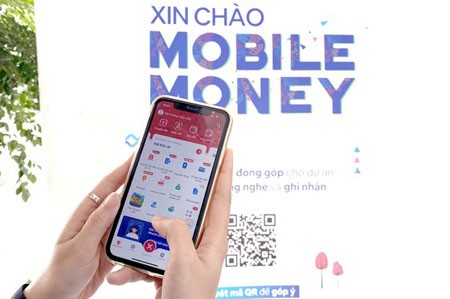
Statistics from the State Bank of Vietnam (SBV) reveal that there are now around 89 million personal payment accounts in Vietnam, meaning nearly 70 percent of Vietnamese adults now own a bank account.
The launch of Mobile Money will strongly promote the use of cashless payment to the other 30 percent of the Vietnamese population, most of whom live in remote areas or the countryside and encounter trouble accessing a bank.
The Ministry of Information and Communications shared that Mobile Money introduction will encourage a raid development among Vietnamese telecoms companies, which now own over 130 million mobile subscribers.
Right now, domestic telecoms businesses are rushing to complete necessary documents to register for a pilot permit in Mobile Money provision. They will be sent to SBV, which will then collect opinions from related agencies like the Ministry of Information & Communications, the Ministry of Public Security before formally issuing this permit.
It is estimated that in the second quarter of this year, major mobile network carriers will launch this lucrative service in Vietnam.
The representative of Vietnam Posts and Telecommunications Group (VNPT) shared that the organization is ready for the introduction of Mobile Money.
Similarly, MobiFone announced that it has just been granted an intermediary payment license by SBV, which is the prerequisite for its Mobile Money pilot scheme. Accordingly, from now on, MobiFone is allowed to offer an e-payment portal, cash collection service, electronic money transfer service, and e-wallet service. This telecoms enterprise is also rushing to complete the application for permission to run Mobile Money.
Viettel’s representative said that the Group has successfully launched the pilot scheme for Mobile Money among its 40,000 selected customers and is now ready to offer the service to all of its subscribers.
The Prime Minister insisted that permitted telecoms businesses must prioritize residents in remote, island and boundary areas of the nation.
Mobile Money is for legal goods and services in Vietnam only, so international payment is not allowed. In addition, Mobile Money only welcomes the use of citizens whose mobile number is registered with a valid ID card or passport and a complete identification procedure.
Therefore, each Vietnamese person can only own one Mobile Money account in one telecoms company. This account is similar to a telecoms account, but can be used for money-related activities. Different from an e-wallet, this account does not require a link to any bank account.
Payments are done via apps (smartphones) or SMS (regular phones or in no-Internet areas). The maximum value of transactions (deposits, withdrawals, payments and money transfers) is VND10 million (US$432) a month.
It is estimate that there will be a significant money flow via this channel each month if about 20-30 percent of 130 million mobile subscribers in Vietnam use Mobile Money, even with a limit of $432.
At the moment, major telecoms businesses in Vietnam are hurriedly preparing necessary legal documents, infrastructure, technologies, human resources for their Mobile Money operation to ensure safety and convenience for users.
The Vietnam Telecoms Authority (under the Ministry of Information and Communications) said that after the release of Decision No. 316/QD-TTG, it asked all interested telecoms enterprises to quickly submit registration documents in March for the evaluation process to be timely done.
The Authority noticed that Mobile Money users may need to pay a certain amount of service fee like other payment services. This fee is regulated by service providers, and is smartly calculated to promote the use of cashless payment methods even in remote and poor areas.
























